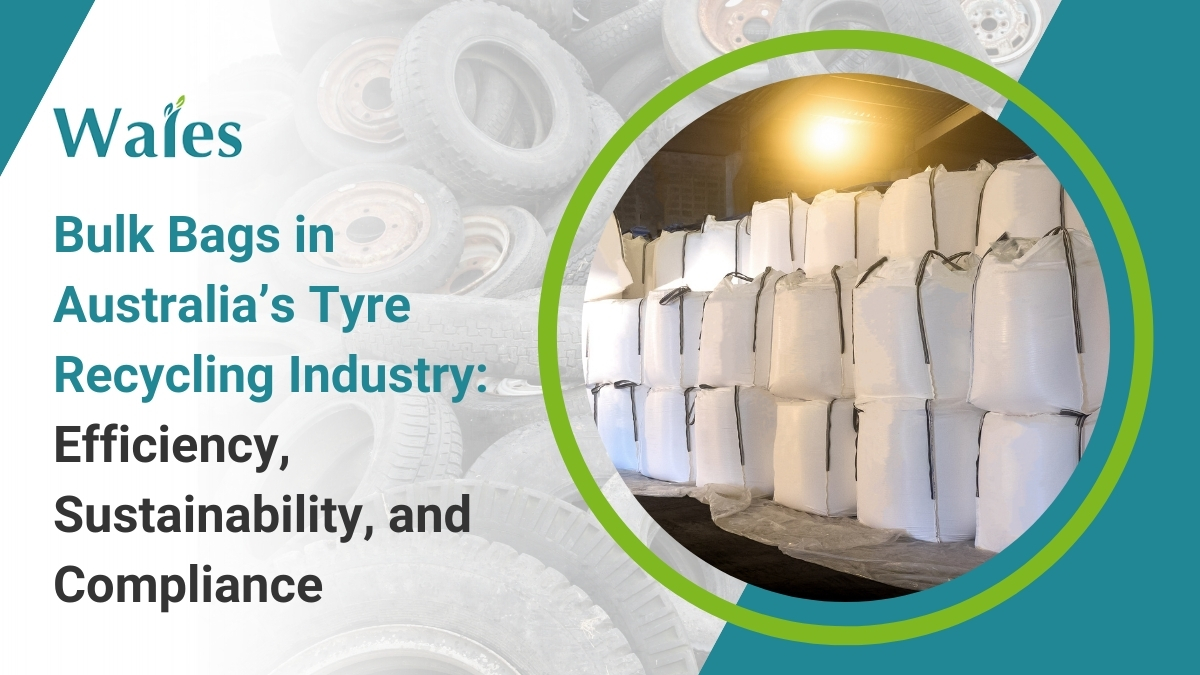
Australia’s Tyre recycling sector is a critical component of the nation’s circular economy, transforming end-of-life tyres into valuable resources like crumb rubber, tyre-derived fuel, and construction materials. Central to this process are bulk bags (also known as Flexible Intermediate Bulk Containers, or FIBCs), which streamline storage, handling, and transportation of recycled tyre products. This blog explores how bulk bags drive efficiency in tyre recycling, highlights leading Australian businesses like ELT Recycling and Oz Tyre Recyclers, and underscores the importance of TSA Accreditation in maintaining industry standards.
Bulk bags are large, woven polypropylene containers designed to hold up to 2,000 kg of material. Their durability, versatility, and cost-effectiveness make them indispensable in industries handling bulk goods—including tyre recycling. Here’s how they add value:
Recycled tyre products, such as rubber chips or crumb rubber, are abrasive and heavy. Bulk bags are engineered to withstand these challenges, thanks to their reinforced stitching and high tensile strength. For instance, Wales Industries’s FIBCs are explicitly designed for “dry, granular, flowable materials” and are “uncompromising in strength during shipping” . This durability reduces the risk of spills and ensures safe transport across Australia’s vast supply chains. All our bags are UV stabilized, due to some road issues in the winter, the supplier may hold the stock in the warehouse for 6 months, our bags are without any problem.
Bulk bags minimize storage and handling costs. A single FIBC can replace dozens of smaller containers, optimizing warehouse space.
Tyre recyclers often require tailored solutions. For example, Wales Industries offers FIBCs in various sizes and configurations, from size 90x90x120cm to 100x100x180cm. Customizable features like Spout top and Spout bottom will help the operations be more smooth.
Sustainability is a cornerstone of tyre recycling. Bulk bags align with this ethos: they are reusable, reducing waste compared to single-use alternatives. Companies like Wales Industries emphasize polypropylene bags that can be repurposed or recycled, supporting a closed-loop system.
TSA (Tyrewise Stewardship Australia) Accredited recyclers must adhere to strict guidelines for material handling. Bulk bags’ leak-proof design and secure closures prevent contamination, ensuring compliance with environmental and workplace safety standards.
ELT Recycling, a key player in Australia, processes thousands of tonnes of end-of-life tyres annually. By utilizing bulk bags, they efficiently store and transport crumb rubber to manufacturers of playground surfaces, asphalt, and sports fields. The company’s reliance on FIBCs underscores their commitment to operational efficiency and reducing landfill waste.
Oz Tyre Recyclers specializes in converting tyres into rubber mulch and industrial feedstock. Their use of bulk bags ensures seamless integration with automated palletizing systems, minimizing manual handling and maximizing throughput.
TSA Accreditation is a rigorous certification ensuring recyclers meet environmental, safety, and operational benchmarks. Bulk bags play a pivotal role here:
This workflow highlights how bulk bags act as a linchpin, ensuring smooth transitions between each stage.
When selecting FIBCs, Wales Industries supply many bulk bags to Tyre Recycling Business in Australia:
Bulk bags are more than just containers—they are catalysts for efficiency and sustainability in Australia’s tyre recycling industry. By enabling safe handling, reducing costs, and supporting TSA compliance, FIBCs empower businesses like ELT Recycling and Oz Tyre Recyclers to lead the charge toward a greener future. As the sector grows, investing in high-quality bulk bags will remain critical for meeting environmental goals and operational demands.
For tyre recyclers, the message is clear: bulk bags aren’t just a packaging solution; they’re a strategic asset in building a circular economy.